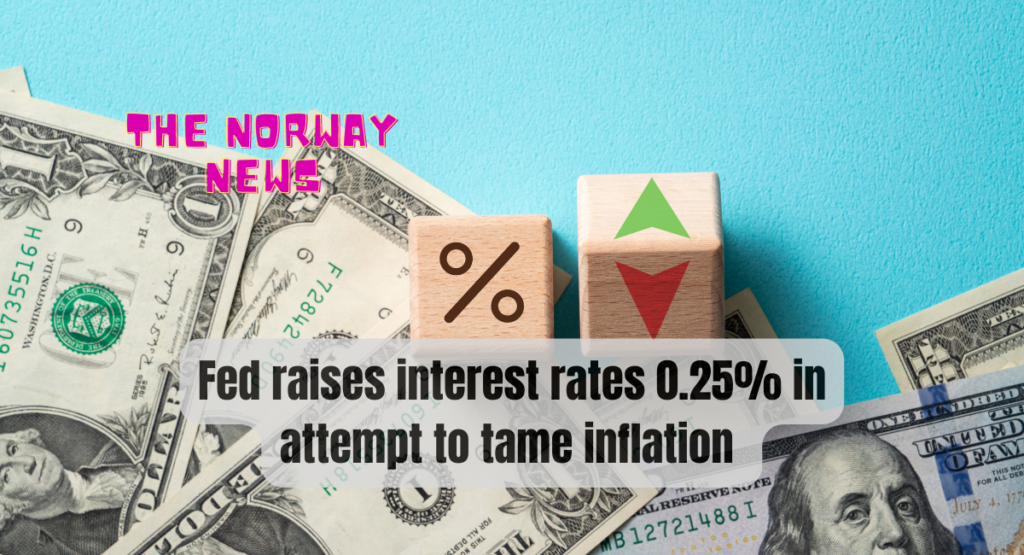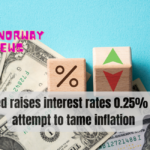One recurring issue that keeps policymakers awake at night in the ever-changing economic landscape is inflation. The Federal Reserve, the United States central bank, plays an important role in controlling the country’s economy and, when necessary, taking actions to address inflationary pressures. The Fed has agreed to hike interest rates by 0.25% to control inflation. This decision has far-reaching consequences for borrowers, savers, investors, and the economy as a whole.
Inflation, or the gradual rising in prices over time, reduces money’s purchasing power. Various circumstances, including increased demand, supply chain disruptions, or government policy changes, can trigger it. When inflation exceeds a specific level, it can negatively influence economic stability and growth. As a result, central banks such as the Federal Reserve step in to help stabilize the economy.
Before digging into the Federal Reserve’s decision, it is vital to grasp inflation. The Consumer Price Index (CPI) tracks the prices of a basket of goods and services to calculate inflation. When the CPI rises, it reflects an increase in the average price of these goods and services. This increase has an impact on consumers, businesses, and the economy as a whole.
The Importance of Interest Rates
Interest rates are critical in managing inflation. When the economy overheats, and inflation rises, the Federal Reserve has the authority to raise interest rates. Borrowing money gets more expensive when interest rates rise. This, in turn, limits expenditure and slows economic development, thus aiding inflation control. When the economy is slowing, and inflation is low, the Fed may decrease interest rates to encourage borrowing and spending.
The Federal Reserve’s Decision
Concerned about growing inflation, the Federal Reserve recently announced a 0.25% interest rate rise. This decision was made to manage potential inflationary risks and ensure economic stability. The Fed’s goal in raising interest rates is to slow the pace of economic expansion and keep inflation from ballooning out of control.
Impact on Borrowers and Savers
Increases in interest rates have a direct influence on borrowers and savers. Borrowing costs rise for borrowers, such as people with mortgages or corporations with loans. This entails higher monthly home payments and higher company expenses. Savers, on the other hand, gain from rising interest rates since they can earn more on their savings or investments. However, financing becomes more expensive, potentially limiting business expansion and consumer spending.
Effect on Investments and Stock Market
Interest rate increases can considerably impact the investing landscape and the stock market. Fixed-income assets become more appealing as interest rates rise, potentially encouraging investors to move funds from stocks to bonds. Stock prices may fall as a result of this shift in investing preferences. Furthermore, increased interest rates can increase companies’ borrowing costs, affecting their profitability and investor confidence.
Pros and Cons of Interest Rate Hikes
Interest rate increases have both benefits and drawbacks. On the plus side, they help to combat inflation and maintain economic stability. The Federal Reserve can limit the risk of runaway inflation and maintain price stability by boosting interest rates. This benefits both consumers and businesses by retaining the purchasing power of their money. On the other hand, interest rate increases can limit economic growth and make borrowing more expensive, potentially leading to lower consumer spending and company investment.
Mitigating Inflationary Pressures
Various than raising interest rates, there are various ways to reduce inflationary pressures. Fiscal policies, such as tax cuts or increased government spending, can have an impact on economic growth. Central banks can also use open market operations to change the money supply by purchasing and selling government securities. These approaches, when paired with interest rate changes, form a comprehensive arsenal for managing inflation.
Implications for the Economy
The Federal Reserve’s decision to boost interest rates has far-reaching consequences for the economy. It demonstrates the central bank’s commitment to inflation control and economic stability. By making timely decisions, the Fed hopes to establish a balance between growth and inflation, guaranteeing a long-term sustainable and healthy economy.
Conclusion
In summary, the Federal Reserve’s recent decision to raise interest rates by 0.25% underscores the Fed’s efforts to combat increasing inflation and foster economic stability. Interest rate increases have repercussions for borrowers, savers, investors, and the economy as a whole. While they can help curb inflation, they can cause difficulties for borrowers and may impact the stock market. The Federal Reserve must weigh the benefits and drawbacks of interest rate increases as it navigates the challenges of regulating inflation and supporting economic growth.
Common Questions
What is inflation?
Inflation is a long-term increase in the general price level of goods and services. It diminishes money’s purchasing power since the same amount may buy fewer products and services.
How does the Federal Reserve control interest rates?
The Federal Reserve uses monetary policy to influence interest rates. It can use open market operations and other instruments to change the target federal funds rate, which influences short-term interest rates.
How do interest rate hikes affect the stock market?
Interest rate increases can have a variety of effects on the stock market. They can make fixed-income investments more appealing, causing investors to transfer capital away from stocks and toward bonds. Furthermore, increasing borrowing rates for businesses can have an impact on their profitability and market mood, perhaps leading stock prices to fall.
What are some strategies to protect savings during inflation?
Individuals can protect their money from inflation by investing in assets that perform well during inflationary periods, such as real estate, commodities, or inflation-protected securities. Diversifying investments and staying current on market movements can also be advantageous.
How do interest rate hikes impact the housing market?
Interest rate increases can have an impact on the property market by making borrowing more expensive. Higher mortgage rates may result in lowering housing affordability and dampening property demand. The impact, however, may vary based on a variety of circumstances, including the overall state of the economy and local market conditions.
Learn more: 4 Signs You Should Try a New MS Treatment







